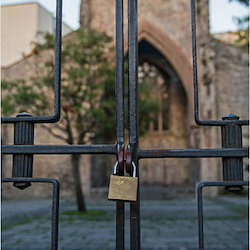
Ninety-five percent of Americans are currently under stay-at-home orders and many Christians are beginning to wonder: “If God calls us to worship him and the government says we cannot, what should we do?”
Technically speaking, this is called a “case of conscience” and with such, there are typically no easy or one-size-fits-all answers.
Richard Baxter (1615-1691) was an English Puritan who included a “Cases of Conscience” section in his book titled: A Body of Practical Divinity, or A Christian Directory.
Though written centuries ago, he does address the case of government shut-down of church services in times of disease. I hope that his answer helps you to think through the question and to keep your conscience clean.
– Pastor McShaffrey
Question: May we omit church assemblies on the Lord’s Day if the magistrate forbid them?
1. It is one thing to forbid them for a time, upon some special cause, (as infection by pestilence, fire, war, etc.) and another to forbid them statedly or profanely.
2. It is one thing to omit them for a time, and another to do it ordinarily.
3. It is one thing to omit them in formal obedience to the law; and another thing to omit them in prudence, or necessity, because we cannot keep them.
The assembly and the circumstances of the assembly must be distinguished.
Distinction 1: If the magistrate for a greater good (such as the common safety), forbid church assemblies in a time of pestilence, assault of enemies, or fire, or the like necessity, it is a duty to obey him.
Reason 1: Because positive duties give place to those great natural duties which are their end: so Christ justified himself and his disciples’ violation of the external rest of the sabbath. “For the sabbath was made for man, and not man for the sabbath.”
Reason 2: Because affirmatives bind not ‘ad semper’ [always] and out-of-season duties become sins.
Reason 3: Because only one Lord’s day or assembly is not to be preferred before many, which by the omission of that one are likely to be obtained.
Distinction 2: If princes profanely forbid holy assemblies and public worship, either statedly, or as a renunciation of Christ and our religion; it is not lawful formally to obey them.
Distinction 3: But it is lawful prudently to do that secretly for the present necessity, which we cannot do publicly, and to do that with small numbers, which we cannot do with greater assemblies, yea, and to omit some assemblies for a time, that we may thereby have opportunity for more: which is not formal but only material obedience.
Next question: But if it be only some circumstances of assembling that are forbidden us, that is the next case to be solved… [read more, beginning on p. 466]
